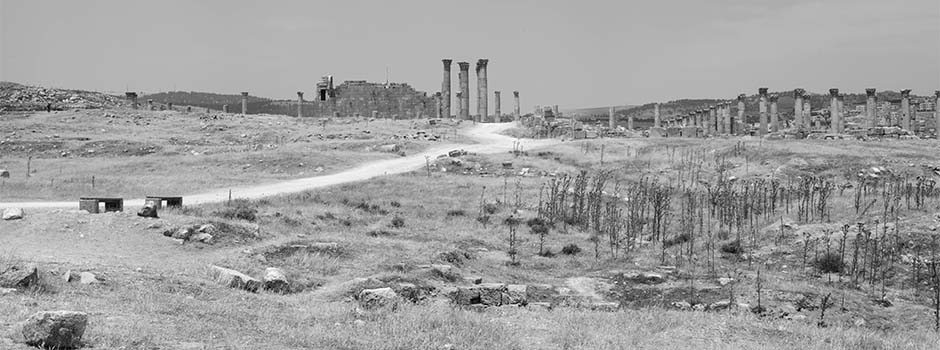
THE THIRD LINE, AL QUOZ 3, DUBAI, UAE (27 FEB – 19 APRIL 2024) Farah Al Qasimi: Toy World
Feb 16, 2024 INSPO, Exhibition

A horse bucks when it senses danger and fears it cannot escape (Horse Bucking Teeth, n.d.). When danger is real, fear abounds. The powers that be recognize it as ammunition for a system of control. You enter the always-panopticon, subject to forever surveillance that does not guarantee safety any more than a fake security camera from the local dollar store (Security Camera, 2017).
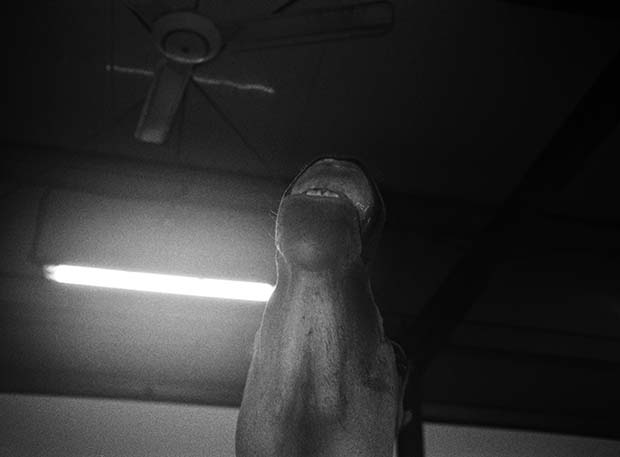 Farah Al Qasimi, Horse Bucking Teeth, n.d., Archival Inkjet Print, 50.8 x 68.58 cm. Edition of 5, 2AP / Photo courtesy of The Third Line and the artist
Farah Al Qasimi, Horse Bucking Teeth, n.d., Archival Inkjet Print, 50.8 x 68.58 cm. Edition of 5, 2AP / Photo courtesy of The Third Line and the artist
Toy World is Farah’s first exhibition featuring black and white images. "Black and white images automatically historicize," she says. The glossy veneer of history allows us to indulge in theory immune from personal responsibility. Too often, we forget that the now we live is just the prototype for future history.
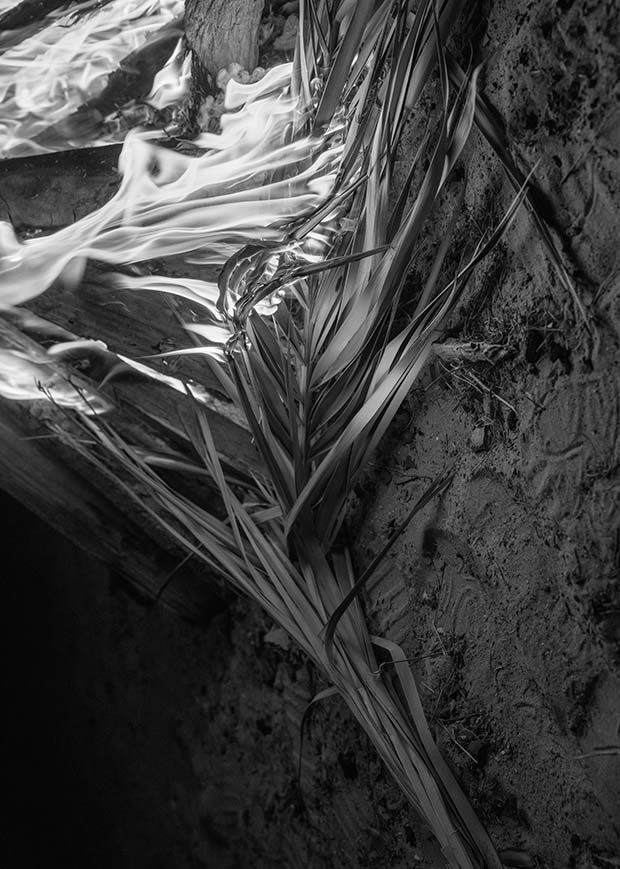 Farah Al Qasimi, Burning Palm, n.d., Archival Inkjet Print, 50.8 x 35.56 cm. Edition of 5, 2AP / Photo courtesy of The Third Line and the artist
Farah Al Qasimi, Burning Palm, n.d., Archival Inkjet Print, 50.8 x 35.56 cm. Edition of 5, 2AP / Photo courtesy of The Third Line and the artist
The carrier pigeon, once used by the military to deliver messages, is now obsolete. And yet a trace of the true self exists in the new self: her descendent, the city pigeon, is itself a message — that of the enshittification of the messages in the images that surround us (Pigeons on Pink Building, 2024).
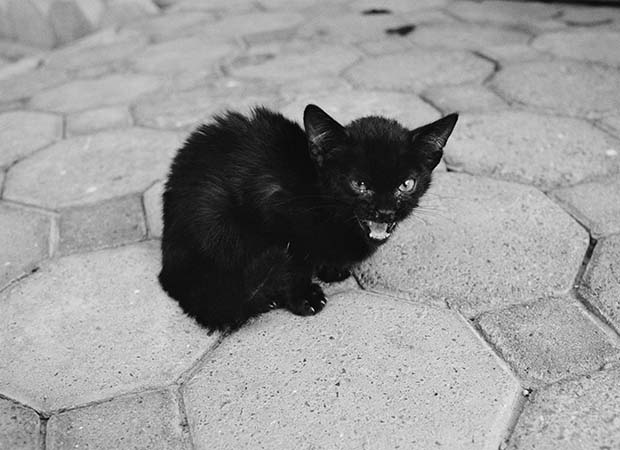 Farah Al Qasimi, Khooshboo, n.d., Archival Inkjet Print, 50.8 x 68.58 cm. Edition of 5, 2AP / Photo courtesy of The Third Line and the artist
Farah Al Qasimi, Khooshboo, n.d., Archival Inkjet Print, 50.8 x 68.58 cm. Edition of 5, 2AP / Photo courtesy of The Third Line and the artist
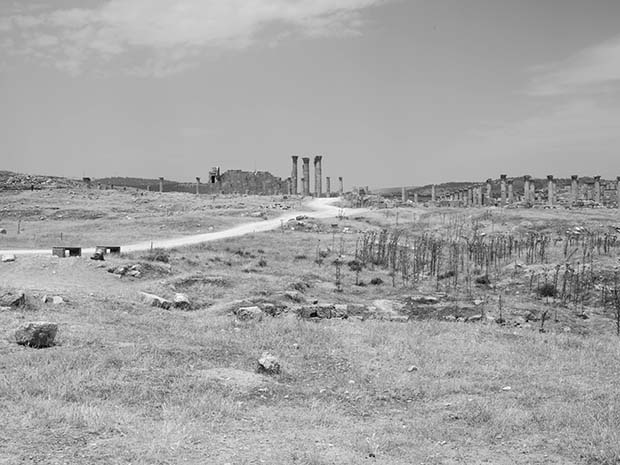 Farah Al Qasimi, Jarash, n.d.,Archival Inkjet Print, 50.8 x 68.58 cm. Edition of 5, 2AP / Photo courtesy of The Third Line and the artist
Farah Al Qasimi, Jarash, n.d.,Archival Inkjet Print, 50.8 x 68.58 cm. Edition of 5, 2AP / Photo courtesy of The Third Line and the artist
We decode messages in the images we obtain through multiple degrees of separation necessarily mediated by trust in the network. We do not have access to the reality that dances forth the images: we must content ourselves with only the images. Eventually, the choreography halts (Baton Girls, 2023). The image-flood makes it easy to feel nothing when confronted with reality in the second degree. The luridity of pain is no longer inherited. Yet the ghosts of the images penetrate our consciousness, reverberating ad infinitum: chicken bones in basmati rice take on the aura of death by drone (Machboos, 2024). I know that the camel bones lying in the barren grass are innocuous victims of the cycle of life, but all I can think of are anonymous human remains, lying forgotten in decimated battlefields that will never bear another rose (Camel Bones, n.d.).
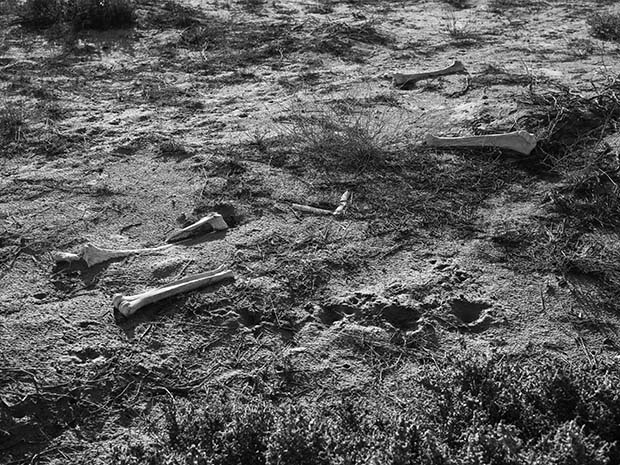 Farah Al Qasimi, Camel Bones, n.d., Archival Inkjet Print, 50.8 x 68.58 cm. Edition of 5, 2AP / Photo courtesy of The Third Line and the artist
Farah Al Qasimi, Camel Bones, n.d., Archival Inkjet Print, 50.8 x 68.58 cm. Edition of 5, 2AP / Photo courtesy of The Third Line and the artist
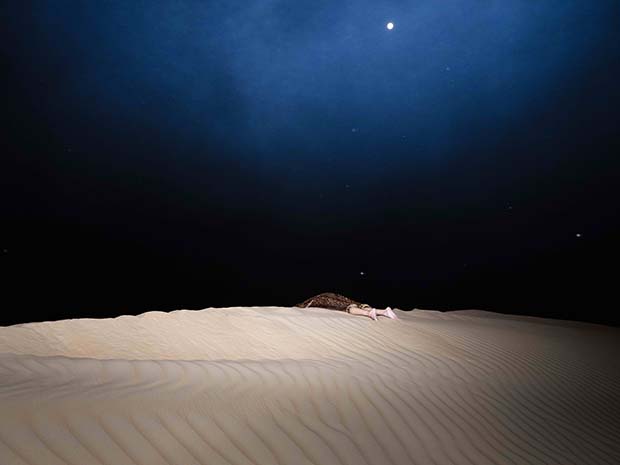 Farah Al Qasimi, Sand Dune, 2023. Archival Inkjet Print, 127 x 76.2 cm. Edition of 5, 2AP / Photo courtesy of The Third Line and the artist
Farah Al Qasimi, Sand Dune, 2023. Archival Inkjet Print, 127 x 76.2 cm. Edition of 5, 2AP / Photo courtesy of The Third Line and the artist
Yet all we have are our sigils, these images. Without them, we lie alone, prostrate in the desert under a starless sky (Sand Dune, 2023).
Farah Al Qasimi (b. 1991, Abu Dhabi, United Arab Emirates; lives and works in Brooklyn, NY) makes photographs, films and music. Often working with large-scale vinyl imagery and a multiplicity of photographic prints and screens, Farah is interested in the internet and its hierarchies of information and emotion. Farah also loves the complexity of storytelling and value-building in children's cartoons, and many of her video works include primary narrators who are anthropomorphized. She has a highly collaborative practice and has worked with hand-sewn puppets, falcons, African Land Snails, exorcists, and most recently, a Jack Sparrow impersonator.
Selected solo exhibitions include; Abort, Retry, Fail, Delfina Foundation, London, UK (2023); The Swarm, Plug in Institute of Contemporary Art, Winnipeg, Canada (2023); Poltergeist, C/O Berlin, Germany (2023); Star Machine, Art Gallery of Western Australia, Perth, Australia (2023); General Behaviour, Cultural Foundation, Abu Dhabi, UAE (2022); Surge, François Ghebaly, Los Angeles, USA (2022); Everywhere there is splendour, Contemporary Art Museum St. Louis, USA (2021); Funhouse, Helena Anrather Gallery, NY, USA (2020); Back and Forth Disco, Public Art Fund, New York, NY, USA (2020); Open Arm Sea, Houston Center for Photography, Houston, TX, USA (2020); Arrival, The Third Line, Dubai, UAE (2019); List Projects: Farah Al Qasimi, MIT List Visual Arts Center, Cambridge, MA, USA (2019); Artist's Rooms, Jameel Arts Centre, Dubai, UAE (2019); More Good News, Helena Anrather, New York (2017).
Farah’s work has been acquired by prominent collections including but not limited to: Museum of Modern Art, New York; Guggenheim Museum, New York; Guggenheim, Abu Dhabi; Centre Pompidou, Paris; San Francisco Museum of Modern Art (SFMOMA), San Francisco; Art Gallery of Western Australia, Perth; Los Angeles County Museum of Art (LACMA), California; Museum of Contemporary Art (MCA), Chicago; and Tate Modern, London. About Sarah Chekfa Sarah Chekfa lives and writes in New York City. Her work has appeared in Flash Art, Vogue, The New York Review of Architecture, Do Not Research, and The Drunken Canal, among other publications.
Founded in 2005, The Third Line is a Dubai-based gallery that represents contemporary artists locally, regionally, and internationally. With over 19 years of dedicated commitment to the arts, it has become a pioneering platform for established talent and emerging voices from the region and its diaspora, building a dynamic program that explores the diversity of practices in the region. Represented artists include Abbas Akhavan, Ala Ebtekar, Amir H. Fallah, Bady Dalloul, Farah Al Qasimi, Farhad Moshiri, Fouad Elkoury, Hassan Hajjaj, Hayv Kahraman, Huda Lutfi, Joana Hadjithomas & Khalil Joreige, Jordan Nassar, Laleh Khorramian, Lamya Gargash, Monir Shahroudy Farmanfarmaian, Nima Nabavi, Pouran Jinchi, Rana Begum, Sahand Hesamiyan, Sarah Awad, Sara Naim, Shirin Aliabadi, Slavs and Tatars, Sophia Al-Maria, Tarek Al-Ghoussein, yasiin bey and Youssef Nabil.
Comments
Add a comment
Commenting is not available in this section entry.